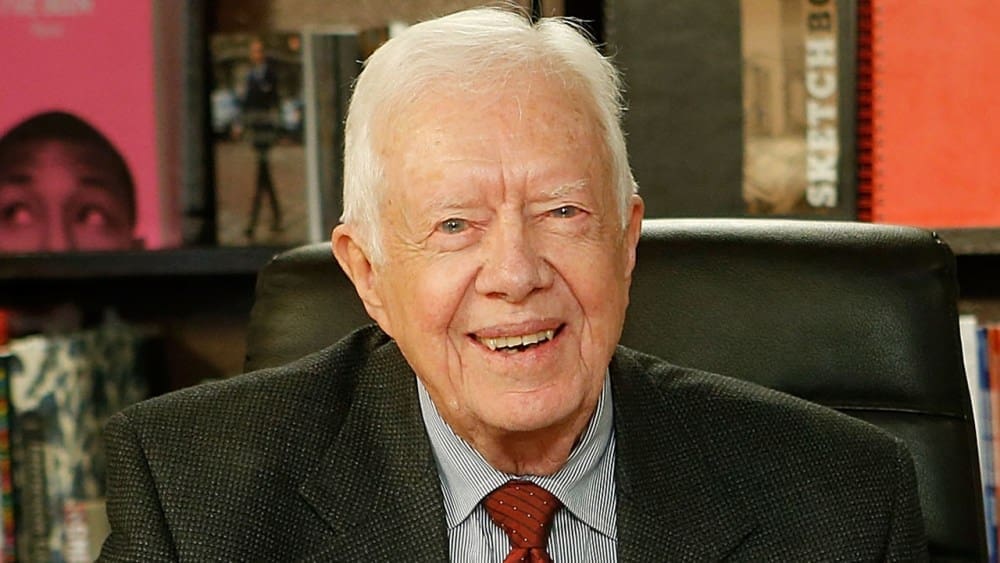Jimmy Carter, the 39th President of the United States, passed away peacefully at the age of 100. A defining figure in American politics, his legacy extends far beyond his presidential term. Carter’s efforts in humanitarian work and conflict resolution earned him a Nobel Peace Prize, leaving an indelible mark on the world stage.
Entering hospice care after battling numerous health issues, including metastatic brain and liver cancers, Jimmy Carter’s final days were spent surrounded by family. His son Chip Carter, reflecting on his father’s enduring legacy, described him as a hero to anyone who values peace, human rights, and love. Chip expressed gratitude for the global family his father helped to build, encouraging all to honor his memory by living these shared beliefs.
An Unexpected Journey to the Presidency
Jimmy Carter’s path to the presidency was as unassuming as it was extraordinary. Emerging in the aftermath of the Watergate scandal, Carter, then a relatively unknown figure, launched his presidential campaign. His honest and straightforward nature provided a refreshing change in a time weary of political deceit. His campaign was marked by a promise to restore integrity to the White House and a commitment to transparent governance.
Before reaching the Oval Office, Carter was a simple peanut farmer from Plains, Georgia. This rural charm, combined with his compelling life story, captivated a nation reeling from political scandals. Despite being an outsider in Washington, his campaign strategy emphasized his honesty and moral integrity, traits that resonated deeply with a disillusioned electorate.
A Presidency Marked by Achievements and Challenges
Serving from 1977 to 1981, Carter’s presidency was a period marked by both substantial achievements and significant challenges. His administration was characterized by efforts to promote energy conservation and forge peace in the Middle East, specifically through the landmark Camp David Accords. However, the period was not without its hurdles, as Carter faced the economic difficulties of stagflation and an energy crisis.
Despite a Democratic majority, Carter’s efforts to pass comprehensive health care reforms were stymied, leading to public frustration. The economic struggles, compounded by the Iranian hostage crisis, further strained his administration. This period of governance highlighted the complexities of leadership and the intricate balance required to steer a nation through tough times.
Legacy Beyond the White House
Beyond his presidency, Carter’s remarkable commitments continued. He dedicated his life to humanitarian efforts and international diplomacy, further securing his legacy as a global peacemaker.
After leaving office, Carter focused on humanitarian projects, notably with Habitat for Humanity. His commitment to fostering peace and democracy led him to supervise elections in foreign countries and tackle global health issues. His enduring dedication to humanitarian causes earned him a Nobel Peace Prize in 2002.
Even after his time in office, Carter’s voice remained relevant, sometimes stirring controversy with his candid views on international matters. His book, “Palestine: Peace Not Apartheid,” sparked debate and showcased his willingness to tackle complex issues, staying true to his roots of honesty and integrity.
Speaking Truth to Power
Carter’s tenure in office and his subsequent years as a statesman were marked by a fearless dedication to truth.
While president, Carter’s speeches often addressed uncomfortable truths, such as the ‘crisis of confidence’ in America. Though criticized, his words highlighted his desire for honest leadership. After leaving office, he continued this frank approach, frequently sharing his perspectives on global affairs.
His ability to speak truthfully, regardless of potential backlash, was a hallmark of Carter’s character. This commitment to honesty solidified his reputation as a principled leader who valued transparent communication above all else.
Humanitarian Pursuits and Global Impact
Carter’s influence extended worldwide, with efforts to achieve peace through diplomatic channels and humanitarian work.
As a former president, Carter harnessed his influence to address pressing global issues. He dedicated his efforts to disease eradication and election monitoring, advocating for human rights on an international stage. These initiatives reflected his persistent commitment to making the world a better place.
His humanitarian work was notable not just for its breadth but for its impact. Carter’s initiatives in health and peace-building continued to inspire global action long after his presidency ended.
A Vision for America’s Future
Carter’s vision extended beyond his presidency, laying a foundation for future generations to build upon.
Though his presidency faced obstacles, Carter’s foresight in areas like renewable energy highlighted his progressive outlook. His policies underscored the importance of sustainability, a notion that remains crucial today.
In many respects, Carter’s ideas were ahead of their time, particularly regarding energy conservation and environmental stewardship. His legacy serves as a reminder of the enduring value of forward-thinking leadership.
Jimmy Carter’s century-long journey has come to an end, but his legacy will continue to inspire. Through his leadership, humanitarian work, and unwavering commitment to peace, Carter touched countless lives around the globe. We remember him not just as a former president, but as a beacon of integrity and hope in a challenging world.
Source: Variety







